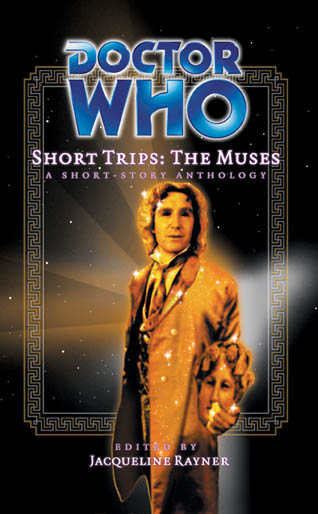Short Trips: The Muses
A Collection of Short Stories

|
|
Big Finish Short Trips: The Muses A Collection of Short Stories |

|
| Editor | Jacqueline Rayner |  |
| Published | 2003 |
| Synopsis: The nine Muses have since ancient times brought inspiration to those willing to receive it. Nine authors have received the inspiration of the Muses, to speak of the mysterious Time Lord known only as 'the Doctor'. |
Three out of Five by Jamas Enright 25/8/04
Another themed short story collection from Big Finish, this time nine stories around the different Muses of Greek myth. As long as we don't get any arty crap from Paul Magrs, we should be fine.
Rob Shearman returns to writing about his favourite Doctor (well, the only Doctor he's ever written about bar The Chimes of Midnight) in Teach Yourself Ballroom Dancing (for the Dancing Muse, Terpischore). I wasn't sure where this story was going, and that feeling held even after I'd finished it. The problem with short stories is the author sometimes goes for an abstract idea than a concrete moment, and it completely slipped past me.
Gareth Roberts takes on the Muse of Comedy, Thalia, with his story The Brain of Socrates. I'm not sure where the humour is in this story. He can still write characters well, but shouldn't a comedy story be funny? Much like Spartans with Aristophanes (according to this story at least), I don't get this one either.
'Tara Samms', last time having delivered a big miss with Face-Painter in the previous Big Finish short story collection, returns with Mordieu to honour Melpomene, the Muse of Tragedy. I have to say that this story is a lot better than 'her' last work, the story is built up better and the ending fits in with the general melancholy endings 'she' works best at.
Simon Guerrier has obviously decided that if he can't have the room to write a proper story, no-one will have a proper story. In An Overture Too Early (for the Muse of Music, Euterpe) Simon Guerrier presents us with the second half of a story, maybe trying to impress by seeming to be 'hip' and 'down with making future references'. Maybe he was trying to get commissioned to tell the rest of the story, but if this is the sort of story he'd come up with to get it, I, for one, wouldn't want him anywhere near a full-sized paperback.
Sarah Groenewegen uses sacred poetry (of which the Muse is Polyhymnia) in a rather unusual way in Hymn of the City, although I have to say to reminded me a lot of what Gary Russell did in Invasion of the Cat People. It's a good story, although some of the motivations as to why people did what they did remained obscure. Would not mind at all if she was given a paperback all her own.
Ian Potter turns in Confabula, a story that isn't what it's about. Unfortunately, it is a rather unsubtle tribute to the Muse of Love, Poetry and Mimcry, Erato (how'd she end up with all those attributes?). In fact, some points are so blatant he may as well called the story 'Love, Poetry and Mimicry, come and get it.' And it also makes one of those unfortunately 'is this really real' plot points that really irk me.
Simon A. Forward gives us a complete mess of a story. The Astronomer's Apprentice is inspired by Urania (the Muse of Astronomy), but I think owes more to whatever fevered imaginations was going through the author's brain at the time. Each section seems to be in a completely different writing style, and the story jumps from plot point to plot point without any rhyme or reason. And the end doesn't make anything better.
Steve Lyons is clearly in the 'Katarina is a companion' camp, giving us Katarina in the Underworld. The story fits rightly with Calliope, the Muse of Epic Poetry and Rhetoric, as Katarina and the Doctor journey for her soul. Yeah, I liked this one (being in the same camp myself), nicely sweet and well written.
Right, so far we've had eight stories featuring each of the eight Doctors. So this story will either be a) a double up of some favourite Doctor, b) a multi-Doctor story or c) some other Doctor... but I'm not going to say which. Justin Richards writes The Glass Princess taking pretty direct inspiration from Clio, the Muse of History. It's a rather bittersweet story, very well crafted, one of Justin Richards' better stories.
I've been more be-mused than a-mused by this collection. There are some nice stories in here, but most of them, for me, completely miss whatever they were aiming for.